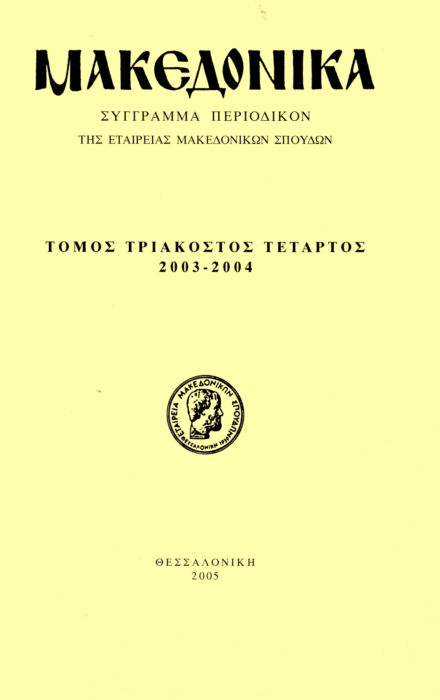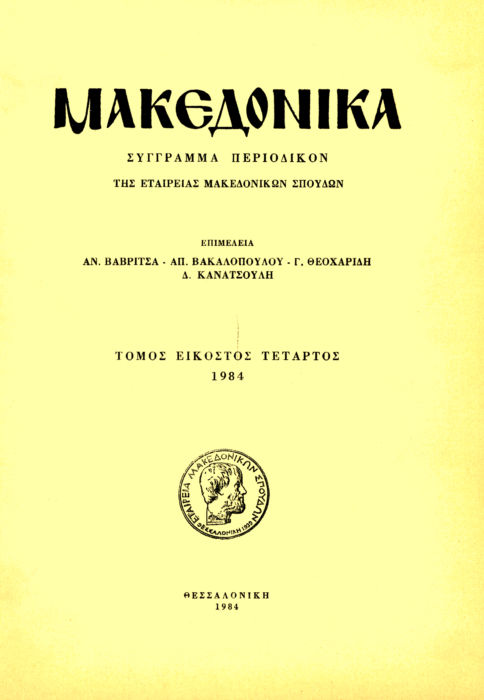The Noble Family of Bekella-Vikela of Veria
Abstract
1. It starts with a detailed «Prolegomena» an introductory preface with a justified reference to it’s dedication to Mr P. N. Linardos a top sport-caster of our country and writer of athletic monographs and among them a detailed one concerning D. Vikelas.
Later, more information is given concerning the previous and subsequent bibliography about D. Vikelas.
In the end all previous publications of Mr G. Ch. Chionidis concerning D. Vikelas are mentioned.
2. Given the fact that D. Vikelas was born (in 1835) in Hermoupolis in the island of Syros, where his parents (descending from Constantinople) were settled because of the preceding inconvenient situation created by the independence revolution of 1821, while his father’s family descended from the Macedonian town of Veria, and his mother’s family came from Ioannina then one question rises, which at last D. Vikelas's home-town and real place of origin was?
The issue becomes more complicated by the fact that D. Vikelas stayed in Hermoupolis Syros until the age of 4, and after that in 1839 he returned with his family to Constantinople, for ten years. After that in 1849 they moved to Odessa of Russia and they came back without his father to Syros in 1850.
Two years later at the age of 17 he moved to London in order to work in the commercial office of his uncles (brothers of his mother) Vasilios and Leon Mêlas.
He stayed in London until 1876 when he returned and settled in Athens at the age of 41 where he lived for 32 years until he died in 1908.
He donated all his books (4.772 volumes) to the public library of Heraklion Crete and that’s why it was named after him as «Vikelea».
His archive (about 190 Files) was finally preserved in the National Library of Athens.
After all this wandering in several places and at various times whereas famous people happen to be born accidentally and then to move and live their lives in different places, it has been evident that the will of the person himself and his wish whenever this has been expressed has to be searched.
In our case, D. Vikelas in his biography «My Life», Athens 1908 wrote among others: «...Άλλ’ αισθάνομαι ότι, εάν ήτο δυνατόν και σήμερον έτι να στήσω τήν σκηνήν μου εις Βέροιαν, εκεί ήθελα άνεύρει την πατρίδα...» this meaning that «...However, I feel that if it was possible for me today to put my tent in Veria that was the place that I wanted my home-town to be...» and he justifies his preference in various ways and in this way he is alienated from Syros.
This is the last point of the research and the questions rising about such issues concerning the place of birth and origin of famous people.
3. Further we start to search for the first headman of the family of D. Vikelas.
Some information of D. Vikelas that have been published in his above mentioned biography are put side by side and compared, following a research of the relative bibliography some new data and the oral tradition.
After a meticulous and complicated research based on the most recent bibliography of Thomas Gavriilidis and Than. Papazotos, an effort has been made to locate the father of the first known Vikelas, that is of Chatzi Manolis Bekella until 1995, whereupon 1 came to the conclusion that he was named Dimitrios according to a detailed review and pendant processing of all data, former and new.
Furthermore the relation and link of the family with other noble families of Veria, as the families of Kritopoulos, Kotounios, the Kounalis, Perdikaris and particularly that of Rahtivan-Raktivan is also considered to be very possible.
4. In the next unit we examine again all the information I have found about other remarkable Bekelles (Vikeles) as well about their (already broke down) mansion («Bekeladiko Spiti») House of Bekelas, according to the existing bibliography.
5. Some more thoughts are stated about the origin and etymology of the fa mily’s name in combination with and based on some opinions with no histo rical back ground and with no justified indications that were expressed and claimed by vlahic speaking writers for the justification of his supposedly vlahic origin as has also happened with the family name Kottounios.
6. D. Vikelas, wrote in his biography that he had a difficulty to write down the family tree & genealogy of his family and his attempt to do that, had been unsuccessful and has shown that he was somehow confused and therefore his information run counter to each other.
Having this in mind (and in order to correct my previous carelessness, to which I was misleaded by D. Vikelas), I bring forward my arguments about five (5) more Bekellas-Vikelas in order to come to the sixth one, Dimitrios Vikelas, the cosmopolitan Macedonian, a remarkable literary man, a fore runner and pioneer for the revival of the Olympic Games in Athens in 1896, who visited Veria in 1901, whereupon he was honoured by the municipal town- council.
Article Details
- How to Cite
-
Χιονίδης Γ. Χ. (2004). The Noble Family of Bekella-Vikela of Veria. Makedonika, 34(1), 67–89. https://doi.org/10.12681/makedonika.869
- Issue
- Vol. 34
- Section
- Articles

This work is licensed under a Creative Commons Attribution-NonCommercial-ShareAlike 4.0 International License.
Authors who publish with this journal agree to the following terms:
- Authors retain copyright and grant the journal right of first publication with the work simultaneously licensed under a Creative Commons Attribution Non-Commercial License that allows others to share the work with an acknowledgement of the work's authorship and initial publication in this journal.
- Authors are able to enter into separate, additional contractual arrangements for the non-exclusive distribution of the journal's published version of the work (e.g. post it to an institutional repository or publish it in a book), with an acknowledgement of its initial publication in this journal.
- Authors are permitted and encouraged to post their work online (preferably in institutional repositories or on their website) prior to and during the submission process, as it can lead to productive exchanges, as well as earlier and greater citation of published work (See The Effect of Open Access).










